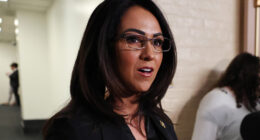
[embedded content]
Did the world really need a biopic of Elvis Presley? Perhaps, but Baz Luhrmann’s Elvis didn’t quite hit the mark — in part because it felt more like a deconstruction of “Colonel” Tom Parker, Presley’s promoter and partner more than a celebration of The King of Rock & Roll. The only real saving grace of this Graceland epic comes from the phenomenal performance of Austin Butler as Presley at all stages of his life. Butler’s performance — including the singing of some songs in the film — makes this worth the price of a ticket.
In some ways, theatergoers have to know what they’re getting from a Luhrmann film in the first place. He’s known for his wretched excess and for his anachronistic soundtracks. Moulin Rouge was a nearly incoherent attempt to marry Elton John’s catalog to a script that essentially fused La Boheme, Hair, and the strange The Dreamers where Henri de Toulouse-Latrec becomes little but a gag. Luhrmann’s most recent major film had Jay Gatsby bouncing through rap and hip-hop parties for half of the film before finally settling down into a relatively coherent and definitely intriguing version of The Great Gatsby.
Luhrmann’s self-referential weirdness is a bit more disciplined in Elvis, with the incoherence mainly contained to the first third of the film through manic quick-cuts, time jumps, and oddball graphics that unfortunately appear at other points of the film. Unfortunately, that’s so wearying that the rest of the film ends up dragging, especially in its final act where the unfortunate clichés of Elvis’s later life get played out slowly, and never with even a hint of nuance or trust in the audience.
** Mild spoilers **
For instance, it’s now well known that Parker had manipulated Elvis and controlled him through a usurious partnership agreement. When it comes to the point where Elvis makes his first Las Vegas appearance, Parker is seen negotiating it on cocktail napkins which include text that Parker’s extensive gambling debts would be canceled if Elvis remained at the International, and that Parker would get unlimited credit for his gambling addiction. This napkin then makes repeated appearances to beat us over the head that Parker was hiding the issue from Elvis. We got it the first time, Baz.
At an earlier point, Parker arranges Elvis’ draft into the US Army to defuse a controversy over his on-stage gyrations. Not only does this conflict with reality — Elvis got drafted in 1958 while the controversy took place in 1956 — the film itself shows the anachronism in its use of newspaper headlines. It’s true that Parker used the draft notice as an opportunity for a strategy shift, but the truth is a lot more nuanced.
READ RELATED: Cope: Biden knows how to fix our problems, it's just out of his immediate control
Even these would be relatively forgivable lapses if the film allowed for as complex a portrait of Parker as it does for Elvis, and for Priscilla Presley for that matter (also played well by Oliva DeJonge). Instead, Tom Hanks’ Parker comes across like a leering, creepy clown whose narrative and commentary literally overrides and attempts to replace that of Elvis’. It’s a rare sour note from Hanks, not for playing the villain that Parker is widely considered to be, but for providing such a cartoonish version of a villain and falling victim to Luhrmann’s own circus-fare instincts. (And was the nose prosthetic really necessary?) Indeed, one has to wonder whether Luhrmann ever drew a connecting line between Parker’s “snowman” strategies and the insane stimuli-overload approach of his own work.
On the other hand, would Butler have gotten this kind of a performance from another director? His performance is so good, so nuanced, and so genuinely moving, that it manages to at least compete against Luhrmann’s worst instincts and Hanks’ one-note contribution. And that, plus DeJonge’s contribution and a marvelous throwback to Memphis’ Beale Street R&B history, makes this worth the journey.
On the Hot Air scale, Elvis gets a 4 for Butler’s performance, and a 2 otherwise:
- 5 – Full price ticket
- 4 – Matinee only
- 3 – Wait for Blu-Ray/DVD/PPV rental or purchase
- 2 – Watch it when it hits Netflix/cable
- 1 – Avoid at all costs
Elvis has a PG-13 rating, for language and sexual suggestiveness, but it’s fine for younger teenagers — if they’re interested in the subject. They may get lost in the first third of the film and never find their way back, but there’s nothing specific that parents need to worry over … ironically, given the subject matter.
Butler’s performance is worth the ticket price, but if you want to know more about the real Elvis Presley, check out Elvis Presley: The Searcher, a 2018 documentary now playing on HBO Max. The two-part film runs for almost three and a half hours, but it’s a terrific look back on Elvis as a human being and as a real artist in his own right, an aspect that gets overlooked in Luhrmann’s film.
The documentary was the brainchild of Priscilla Presley and Elvis’ lifelong friend Jerry Schilling, both of whom served as executive producers, along with others. This holistic look at Elvis’ life includes a wide variety of voices, including a number of audio clips of interviews with Elvis himself. They even allow Parker to speak for himself through old interview clips (Parker passed away in 1997), even though the film is almost entirely negatively oriented to Parker. This film makes Presley’s agency in his music very clear, and pays homage to the real reasons Elvis became King in the first place. Perhaps the best commentary on Elvis’ artistic might come from his later rock successors — Tom Petty, Bruce Springsteen, Robbie Robertson — who not only recognize Elvis’ genius but also his unique vulnerability as a pioneer not just in music but also in celebrity.
Even though Elvis Presley: The Searcher is almost an hour longer than Lurhmann’s Elvis, it never feels long or repetitive or clichéd. And even with Butler’s amazing performance, the audience comes much closer to the real, amazing, and complicated Elvis Presley in this documentary.
Source:






